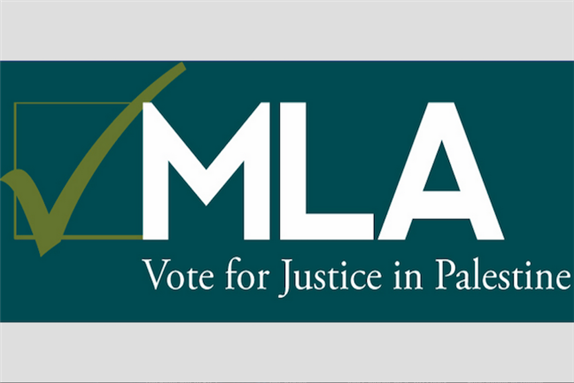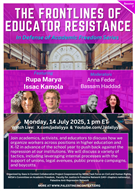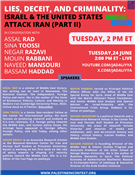[This statement was originally published on 30 January 2017. The initial signatories are Modern Language Assocation (MLA) prize winners, current Delegate Assembly members, and past Executive Council members and MLA presidents. The petition is now open to all active and past members of the MLA; for more information, or to sign on to this petition, click here.]
30 January 2017
To the Executive Council of the Modern Language Association:
We write collectively as MLA award winners, current Delegate Assembly members, and past Executive Council members and MLA presidents, representing a diversity of viewpoints on the Boycott, Divestment, and Sanctions (BDS) movement. While we are honored, variously, to have served the organization and received gratifying recognition for our work, we are also deeply concerned about the approval of an anti-boycott resolution by the majority of members of the Delegate Assembly.
Resolution 2017-1 states that the MLA shall “refrain from endorsing the boycott” against Israel, now and implicitly in perpetuity. We understand that the Executive Council will deliberate as to whether the resolution should be voted upon by the General Membership. In attempting to preempt future discussions of a boycott, 2017-1 adopts a tactic akin to state legislative efforts that have been deemed both unconstitutional and a suppression of free speech rights. It stifles dissent by effectively silencing BDS supporters within the context of MLA governance. Coming from those who claimed that the defeated Boycott Resolution was a denial of academic freedom, 2017-1 truly chills speech. In this it dangerously accedes to the authoritarian, anti-democratic temper of the new Trump administration—surely not a temper the MLA wishes to adopt. Finally, by shielding only the state of Israel from boycott endorsement, the resolution participates in the exceptionalist treatment too often accorded that state. Put bluntly, if passed it would deprive us of a constitutionally-protected form of free speech. Boycotts are a time-honored form of registering protest and disengaging ethically from unconscionable practices.
We are also dismayed by an additional resolution, 2017-3, despite its having been tabled. 2017-3 condemned Hamas and the Palestinian Authority for violating academic freedom, thereby paradoxically supporting the academic freedom of Palestinian scholars only when curtailed by Hamas and the Palestinian Authority. In one fell swoop, this resolution, a transparent redirect away from the structures of oppression, would have excused Israel`s role in denying academic freedom to Palestinians while blaming Palestinians themselves for the conditions of Israeli occupation.
A final, emergency resolution was passed condemning the attenuation of academic freedom imminent under the Trump administration. The irony of passing this resolution while just having approved another one designed to suffocate the academic freedom of BDS supporters is self-evident. That the Delegate Assembly at once protested Trump`s agenda while simultaneously reproducing some of its worst attributes signals at best a paradoxical deployment of the standards of academic freedom. At worst, it underscores the ethical confusion of the Delegate Assembly in these matters.
We all agree that resolution 2017-1 should be soundly and without equivocation defeated. The very existence of 2017-1 is a blight on the the ethical orientations of the MLA. We urge the MLA leadership to think critically about its role in challenging the uneven application of academic freedom and therefore not bring before its general membership this resolution that would chill dissent, preempt debate, and prohibit vital on-going conversations about BDS and the role of the US academy.
Sadia Abbas, Associate Professor, Rutgers University, 2014 MLA Prize for First Book
Anjali Arondekar, Associate Professor, University of California, Santa Cruz, 2010 Alan Bray Memorial Book Prize, MLA GL/Q Caucus
Stephanie Leigh Batiste, Associate Professor, University of California, Santa Barbara, 2012 William Sanders Scarborough Prize
Lauren Berlant, Professor, University of Chicago, 2013 co-winner Alan Bray Memorial Book Prize, MLA GL/Q Caucus
Ian Balfour, Professor of English, York University, 2003 Scaglione Prize for Comparative Literary Studies; Delegate Assembly 2016-2019
Jennifer DeVere Brody, Professor, Stanford University, 2000 Special Citation, Crompton-Noll Award, MLA GL/Q Caucus
Raúl Coronado, Associate Professor, University of Califoria, Berkeley, 2013 MLA Prize for First Book; member and former chair of the Latina/o Literature and Culture Forum
Peter Coviello, Professor, University of Illinois-Chicago, 2016 Honorable Mention, Alan Bray Memorial Book Prize, MLA GL/Q Caucus
Paul Downes, Associate Professor, University of Toronto, 2002 MLA Prize for First Book
Erica Edwards, Associate Professor, UC Riverside, 2014 William Sanders Scarborough Prize.
Nergis Ertürk, Associate Professor, Penn State University, 2012 MLA Prize for First Book, chair 20th and 21st Century Comparative Literary and Cultural Studies Forum.
Elizabeth Freeman, Professor, University of California, Davis, 2014 Norman Foerster Prize, MLA American Literature Section
Rosa-Linda Fregoso, Professor Emeritus/Research Professor, University of California, Santa Cruz, 2004 Winner MLA Book Prize for U.S. Latina/o, Chicana/o Literary and Cultural Studies
Laura G. Gutiérrez Associate Professor University of Texas at Austin, 2010 MLA Book Prize for Latina/o, Chicana/o Literary and Cultural Studies
Ku`ualoha Ho`omanawanui, Associate Professor, University of Hawai’i, 2014-15 Honorable Mention, MLA Book Prize for Studies in Native American Literatures, Cultures, and Languages
Hsuan Hsu, Professor, University of California, Davis, Honorable Mention, 2009 Norman Foerster Prize, MLA American Literature Section
Virginia Jackson, Professor, ICI Endowed Chair in Rhetoric, University of California, Irvine, 2006 MLA Prize for First Book
Toni Wall Jaudon, Assistant Professor, Hendrix College, 2013 Foerster Prize, MLA American Literature Section
Daniel Justice, Professor, University of British Columbia, 2014-15 MLA Book Prize for Studies in Native American Literatures, Cultures, and Languages
Regina Kunzel, Professor, Princeton University, 2009 Alan Bray Memorial Book Prize, MLA GL/Q Caucus
Caroline Levine, Professor, Cornell University, 2016 James Russell Lowell Prize
Elizabeth Losh, Associate Professor, College of William and Mary, 2017 Honorable Mention, Mina Shaughnessy Award
Dana Luciano, Associate Professor, Georgetown University, 2008 MLA First Book Prize; 2013 co-winner Crompton-Noll Best Article Award, MLA GL/Q Caucus.
Uri MacMillan, Associate Professor, University of California, Los Angeles, 2016 William Sanders Scarborough Prize
Meredith Martin, Associate Professor, Princeton University, 2012 MLA First Book Prize
Angela Naimou, Associate Professor, Clemson University, 2015 Honorable Mention, William Sanders Scarborough Prize
Sianne Ngai, Professor, Stanford University, 2013 James Russell Lowell Prize
Ricardo Ortiz, Professor, Georgetown University, 2008 Honorable Mention Alan Bray Memorial prize, MLA GL/Q Caucus
Crystal Parikh, Associate Professor, New York University, 2009 MLA Book Prize for U.S. Latina/o, Chicana/o Literary and Cultural Studies
Samantha Pinto, Associate Professor, Georgetown University, 2013 William Sanders Scarborough Prize
Jasbir K. Puar, Associate Professor, Rutgers University, 2016 co-winner, Crompton-Noll Best Article Award, MLA GL/Q Caucus; 2012 Michael Lynch Service Award, MLA GL/Q Caucus
Chandan Reddy, Associate Professor, University of Washington, Seattle, 2013 co-winner Alan Bray Memorial Book Prize, MLA GL/Q Caucus
Paul K. Saint-Amour, University of Pennsylvania, 2004 MLA First Book Prize, 2016 Matei Calinescu Prize
Barbara Spackman, Giovanni and Ruth Elizabeth Cecchetti Chair of Italian Studies, University of California, Berkeley; 1998 Howard R. Marraro and Aldo and Jeanne Scaglione Prizes for Italian Literary Studies; Delegate Assembly 2016-2019.
L.H. Stallings, Associate Professor, University of Maryland, 2016 Alan Bray Memorial Book Prize, MLA GL/Q Caucus
Jordan Alexander Stein, Associate Professor, Fordham University, 2009 Honorable Mention, Norman Foerster Prize, MLA American Literature Section
Rebecca L. Walkowitz, Professor, Rutgers University, 2016 Honorable Mention, Matei Calinescu Prize
Alexander Weheliye, Professor, Northwestern University, 2006 William Sanders Scarborough Prize, 2006
Houston Baker, Distinguished University Professor, Vanderbilt University, 1992 MLA President
Margaret Ferguson, Distinguished Professor, UC Davis, 2014 MLA President
Samer Mahdy Ali, Associate Professor, University of Michigan, Executive Council Member 2012-2016
Judith Butler, Maxine Elliot Professor of Comparative Literature, University of California, Berkeley, Executive Council Member 2000-2003
John Guillory, Silver Professor of English, New York University, Executive Council Member 2004-2007
Richard Ohmann, Professor, Wesleyan University, Executive Council Member 2010-2014
Zahid Chaudhary, Associate Professor, Princeton University, Delegate Assembly 2015-2018
Bishnupriya Ghosh, Professor, Department of English, University of California, Santa Barbara, Delegate Assembly 2017-2020
Yogita Goyal, Associate Professor, University of California, Los Angeles, Delegate Assembly 2016-2019
Salah Hassan, Associate Professor, Michigan State University, Delegate Assembly 2015-2017
Peter Hitchcock, Professor, Baruch College/CUNY Graduate Center, Delegate Assembly 2015-17
Adeline Koh, Associate Professor, Stockton University, Delegate Assembly 2013-18
Alex Lubin, Professor, University of New Mexico, Delegate Assembly 2017-2020
Christopher Newfield, Professor, University of California, Santa Barbara, Delegate Assembly 2015-2017
Stephen Sheehi, Professor, William and Mary College, Delegate Assembly 2016-2018
Karen Shimakawa, Professor, New York University, Delegate Assembly 2013-2017
Jennifer Wicke, Delegate Assembly 2012-2015, Delegate Assembly Organizing Committee Chair 2014


















